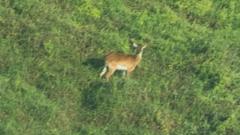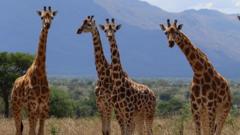Researchers have made a significant wildlife discovery in the Kamalondo Depression of southern Democratic Republic of Congo. For the first time ever, they have captured and published a photo of the Upemba Lechwe, an extremely rare antelope species. During an aerial survey, only 10 individuals were spotted, suggesting that the total population is likely less than 100, which places the species on the verge of extinction.
Manuel Weber, the lead researcher, emphasized the critical state of the Upemba Lechwe, noting the antelope's distinctive features, such as the lack of dark stripes on its legs and shoulders compared to other antelope species in the region. "This area is a magical place in terms of biodiversity," Weber explained, but he cautioned that increasing human activity, hunting, and fishing are risks to the local ecology.
He highlighted the urgent need for conservation efforts, stating that the continued existence of the Upemba Lechwe is remarkable, but without immediate action to protect their habitat, they are at risk of vanishing. This survey marks the first time this species has been assessed in over five decades. The need to save the Upemba Lechwe is urgent, reminding us of the critical importance of wildlife conservation in the face of human encroachment.
Manuel Weber, the lead researcher, emphasized the critical state of the Upemba Lechwe, noting the antelope's distinctive features, such as the lack of dark stripes on its legs and shoulders compared to other antelope species in the region. "This area is a magical place in terms of biodiversity," Weber explained, but he cautioned that increasing human activity, hunting, and fishing are risks to the local ecology.
He highlighted the urgent need for conservation efforts, stating that the continued existence of the Upemba Lechwe is remarkable, but without immediate action to protect their habitat, they are at risk of vanishing. This survey marks the first time this species has been assessed in over five decades. The need to save the Upemba Lechwe is urgent, reminding us of the critical importance of wildlife conservation in the face of human encroachment.



















